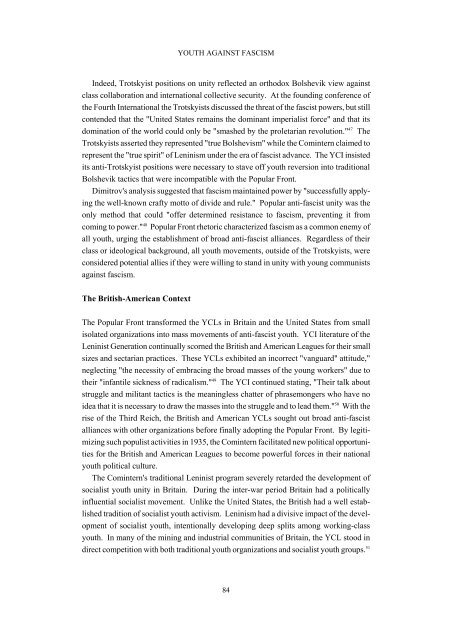Joel A Lewis Youth Against Fascism.pdf
Joel A Lewis Youth Against Fascism.pdf
Joel A Lewis Youth Against Fascism.pdf
Create successful ePaper yourself
Turn your PDF publications into a flip-book with our unique Google optimized e-Paper software.
YOUTH AGAINST FASCISM<br />
Indeed, Trotskyist positions on unity reflected an orthodox Bolshevik view against<br />
class collaboration and international collective security. At the founding conference of<br />
the Fourth International the Trotskyists discussed the threat of the fascist powers, but still<br />
contended that the "United States remains the dominant imperialist force" and that its<br />
domination of the world could only be "smashed by the proletarian revolution." 47 The<br />
Trotskyists asserted they represented "true Bolshevism" while the Comintern claimed to<br />
represent the "true spirit" of Leninism under the era of fascist advance. The YCI insisted<br />
its anti-Trotskyist positions were necessary to stave off youth reversion into traditional<br />
Bolshevik tactics that were incompatible with the Popular Front.<br />
Dimitrov's analysis suggested that fascism maintained power by "successfully applying<br />
the well-known crafty motto of divide and rule." Popular anti-fascist unity was the<br />
only method that could "offer determined resistance to fascism, preventing it from<br />
coming to power." 48 Popular Front rhetoric characterized fascism as a common enemy of<br />
all youth, urging the establishment of broad anti-fascist alliances. Regardless of their<br />
class or ideological background, all youth movements, outside of the Trotskyists, were<br />
considered potential allies if they were willing to stand in unity with young communists<br />
against fascism.<br />
The British-American Context<br />
The Popular Front transformed the YCLs in Britain and the United States from small<br />
isolated organizations into mass movements of anti-fascist youth. YCI literature of the<br />
Leninist Generation continually scorned the British and American Leagues for their small<br />
sizes and sectarian practices. These YCLs exhibited an incorrect "vanguard" attitude,"<br />
neglecting "the necessity of embracing the broad masses of the young workers" due to<br />
their "infantile sickness of radicalism." 49 The YCI continued stating, "Their talk about<br />
struggle and militant tactics is the meaningless chatter of phrasemongers who have no<br />
idea that it is necessary to draw the masses into the struggle and to lead them." 50 With the<br />
rise of the Third Reich, the British and American YCLs sought out broad anti-fascist<br />
alliances with other organizations before finally adopting the Popular Front. By legitimizing<br />
such populist activities in 1935, the Comintern facilitated new political opportunities<br />
for the British and American Leagues to become powerful forces in their national<br />
youth political culture.<br />
The Comintern's traditional Leninist program severely retarded the development of<br />
socialist youth unity in Britain. During the inter-war period Britain had a politically<br />
influential socialist movement. Unlike the United States, the British had a well established<br />
tradition of socialist youth activism. Leninism had a divisive impact of the development<br />
of socialist youth, intentionally developing deep splits among working-class<br />
youth. In many of the mining and industrial communities of Britain, the YCL stood in<br />
direct competition with both traditional youth organizations and socialist youth groups. 51<br />
84

















